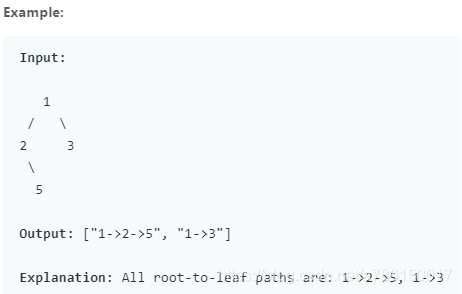版权声明:本文为博主原创文章,未经博主允许不得转载。 https://blog.csdn.net/a786150017/article/details/84957671
257. Binary Tree Paths
题目描述
给定二叉树,返回所有根节点-叶节点路径。
例子
思想
截止条件:到达叶节点(not root.left and not root.right)
解法
# Definition for a binary tree node.
# class TreeNode(object):
# def __init__(self, x):
# self.val = x
# self.left = None
# self.right = None
class Solution(object):
def binaryTreePaths(self, root):
"""
:type root: TreeNode
:rtype: List[str]
"""
if not root:
return []
res = []
self.dfs(root, str(root.val), res)
return res
def dfs(self, root, temp, res):
if not root.left and not root.right:
res.append(temp)
return
if root.left:
self.dfs(root.left, temp + '->' + str(root.left.val), res)
if root.right:
self.dfs(root.right, temp + '->' + str(root.right.val), res)
精简
# Definition for a binary tree node.
# class TreeNode(object):
# def __init__(self, x):
# self.val = x
# self.left = None
# self.right = None
class Solution(object):
def binaryTreePaths(self, root):
"""
:type root: TreeNode
:rtype: List[str]
"""
if not root:
return []
if not root.left and not root.right:
return [str(root.val)]
paths = self.binaryTreePaths(root.left) + self.binaryTreePaths(root.right)
return [str(root.val) + '->' + path for path in paths]
93. Restore IP Addresses
题目描述
给定只包含数字的字符串,返回所有可能有效的IP地址组合。
例子
Input: “25525511135”
Output: [“255.255.11.135”, “255.255.111.35”]
思想
合法的IP地址由四个0到255的整数组成。且多个数字时要注意首位不能为0,因为01.0.0.0 这样的IP是不符合规范的。
每位可能的数字位数是1-3位。所以,遍历所有可能的位数(1位、2位、3位且不超过255)。
[截止条件]:刚好遍历完,且4位,存储;到达4位但没有遍历完,直接return。
解法
class Solution(object):
def restoreIpAddresses(self, s):
"""
:type s: str
:rtype: List[str]
"""
res = []
self.dfs(s, [], res)
return res
def dfs(self, s, temp, res):
if not s:
if len(temp) == 4:
res.append('.'.join(temp))
return
if len(temp) == 4:
return
self.dfs(s[1:], temp + [s[0]], res)
if s[0] != '0':
if len(s) >= 2:
self.dfs(s[2:], temp + [s[:2]], res)
if len(s) >= 3 and int(s[:3]) <= 255:
self.dfs(s[3:], temp + [s[:3]], res)
